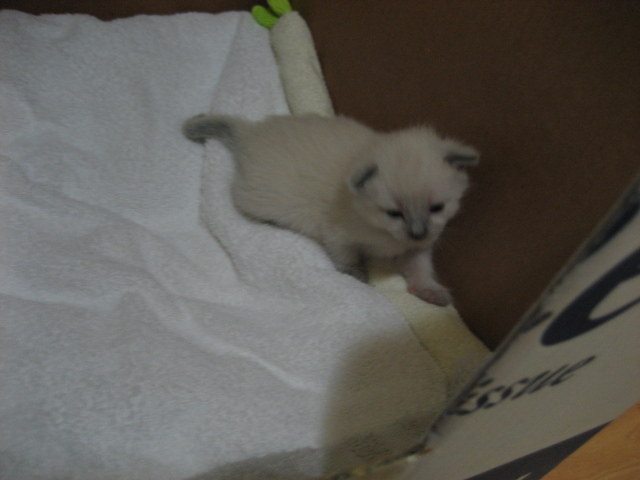QuestionThere is a cat that I found outside. I'm not sure what breed he is, but his fur is grey. He is also losing some fur and has bumps over his skin. Do you know what kind of skin disease this is and how I could treat it?
AnswerRaven,
I'd like to start off by reiterating the fact that I am not a veterinarian and therefore I can't make a diagnosis (neither can a vet without seeing the cat) or make treatment recommendations. I have done some research and this answer will provide you with some basic information about skin conditions in cats and in some cases how they're normally diagnosed and treated. This isn't intended to be a substitute for veterinary care and my recommendation would be that you seek prompt medical attention for your new kitty so that s/he can be diagnosed and treated appropriately as quickly as possible so that s/he can go about the business of being a happy, healthy cat and wonderful companion.
Cats who suffer from skin conditions can be difficult to diagnose and treat and over the years I've learned that conventional medicine doesn't always have all of the answers. My family vet is an absolutely fantastic vet who uses homeopathy and conventional medicine within her practice. Sometimes homeopathic remedies are given instead of traditional drugs, other times my vet uses homeopathy to compliment conventional treatments. It's crucial to find an experienced, level headed, down to earth practitioner that is willing to explain any diagnosis, treatment options and prognosis - if you aren't comfortable with your vet then it's quite possible that your cat's health may suffer. I've found that the best way to find a great vet is to take some time and ask friends and co-workers who are pet parents which veterinarians they're comfortable with and who they'd recommend. It's only fair to warn you that your new feline friend's skin condition may be difficult and expensive to diagnose and the reality is that his long term prognosis really depends upon the underlying cause of his skin issues.
This is a situation where I'd highly recommend that you consider seeking the advice of an experienced holistic veterinarian. Holistic vets are licensed veterinarians who have been trained in conventional veterinary medicine, these dedicated animal doctors have also furthered their education by taking courses about one or more alternative therapies which can include homeopathy, acupuncture, massage or herbal medicine to name some fairly common options. My veterinarian is a holistic vet who uses homeopathy instead of or in combination with conventional medicine to treat her patients and she is absolutely fantastic.
Samuel Hahnemann (1755-1843) was a German doctor who is credited with the discovery of homeopathy. The word homeopathy actually means "similar suffering" and the main premise of homeopathic medicine is the Law of Similars which simply defined is like cures like. Dr. Hahnemann discovered this principle as he translated William Cullen's A treatise of the materia medica to German. In this work William Cullen noted that cinchona bark was an effective treatment for malaria, Cullen's explanation was that cinchona bark strengthened the stomach. Hahnemann wasn't prepared to accept that explanation so he took a dose of cinchona bark twice daily for several days, during that time he began to develop the symptoms of malaria. Dr. Hahnemann's conclusion based on his experience was that in order for drugs to be effective at treating specific conditions they needed to produce similar symptoms to those experienced by people suffering from that condition when given to healthy people. After this discovery countless substances were tested to determine the symptoms that each would produce in a healthy person, this information was used to determine which diseases or symptoms a specific substance would effectively treat. Hahnemann realized that some of the substances being tested wouldn't be acceptable to use as treatments as full strength so he began diluting various substances using alcohol anywhere from 10 to hundreds of times.
Initially I was somewhat skeptical about the use of homeopathy and my attitude was essentially that the remedies wouldn't cause any harm and they might be effective and that's how my cats began receiving homeopathic remedies for any number of conditions. Over the years I've seen some amazing things happen when my cats have been given the right homeopathic remedy at the right time. Feline skin conditions can be difficult to diagnose and treat using conventional medicine alone because Western medicine doesn't have all of the answers. I recommend that you consider approaching your kitty's health concerns by choosing a practitioner who is comfortable with a more holistic approach to treating this little guy. An experienced holistic vet is a fantastic resource and allexperts.com actually has a great holistic vet in the Ask a Vet segment of the website. Dr. Christine Chambreau, is a holistic vet trained in homeopathic medicine. I've had occasion to ask her questions from time to time and I've found that her approach tends to be focused on using homeopathic medicine to treat conditions whenever appropriate. In Dr. Chambreau's answers she provides information about how to get in touch with her, if nothing has changed since I last asked this vet a question she will consult online or by telephone anywhere in the US, however there is a fee for her consultations.
It may be difficult for your vet to diagnose and find an appropriate treatment to deal with the underlying cause of the cat's skin condition. At the moment it doesn't matter much what's causing the cat's skin condition, he needs to be seen by a veterinarian as soon as possible because he's probably quite miserable if he's developed a skin infection or he's very itchy. Since this kitty has an obvious skin infection I suspect that any vet will recommend having some basic diagnostic tests done to develop a more complete understanding of what may be causing your cat's skin condition. Any time that a cat goes to the vet for an illness or injury of any kind the vet will start off by taking a complete history and performing a thorough physical exam, the consultation fee covers these exams in most veterinary clinics. Your vet will most likely want to know whether or not your cat seems itchy, if he's eating, drinking, urinating, defecating well and if he's showing any other signs of illness such as lethargy, fever, loss of appetite, excessive thirst, vomiting or diarrea. Your vet will also want to know if the cat has fleas, ticks or other external parasites so s/he may examine the cat's skin thoroughly and use a flea comb to see whether or not any fleas are present. If the cat has fleas the vet will most likely recommend using a product that will kill the fleas quickly and safely such as Advantage or other monthly flea preventatives. Cats can suffer from a condition called flea bite dermatitis, these cats are highly allergic to flea saliva and they become extremely itchy, sometimes to the point of significant hair loss and skin irritation.
If your newly rescued cat does not have fleas your vet may suggest a skin scraping, this is a painless test where a scalpel blade is used to gently scrape off a small amount of skin cells and examine them under the microscope. A skin scraping may reveal that your kitty has some form of mange, the most common form of mange in cats is called notoedric mange and it's caused by a spider like external parasite which causes the cat to be quite itchy and uncomfortable. Your kitty may also have lice or demodectic mange, both of these conditions cause intense itchiness and discomfort which can lead to skin irritation and hair loss. Sometimes skin problems in cats can be related to fungal infections like ringworm which is contagious to other animals and people. Your vet can diagnose a fungal infection by sending a fungal culture to be analyzed by a veterinary pathologist. Sometimes skin problems in cats can be related to food or environmental allergies so your vet may recommend allergy testing and/or a change in his diet. I do recommend that you research any diets recommended by your veterinarian thoroughly before making any decisions about your cat's diet. I'd recommend that you check out the following websites: catinfo.org (created by a veterinarian, provides in depth information about feline nutrition and other aspects of caring for your kitty) and catnutrition.org (great information about nutrition, explanations provided in great detail). I also have an article that provides important information about most commercially produced pet foods and the often disgusting and potentially dangerous ingredients that some of these foods contain.
If the vet hasn't been able to provide you with a diagnosis after performing the tests I've described above then s/he may need to perform more invasive tests such as a skin biopsy which can provide information about the type of skin condition the cat is suffering from. Routine blood work including a pre-anesthetic blood test, blood chemistry and CBC (complete blood count) may help to determine if your cat is suffering from an infection, auto-immune condition or compromised immune system. If your vet draws blood for these tests then I'd also recommend that you have him/her test for chronic viral infections such as feline leukemia and FIV which can both act somewhat similar to HIV/AIDS in people (don't worry it can't be passed from cat to person).
Rescued stray kitties often have health issues of varying descriptions because they come into contact with wildlife more frequently, stray cats tend to have poor nutrition and minimal if any veterinary care and their lifestyle is very stressful. Bacterial skin infections such as pyoderma can cause a condition called miliary dermatitis which can cause hair loss and a rash. When a cat is extremely itchy and scratches his skin frequently he may break the normal defenses of his skin down making him more vulnerable to skin conditions which are less common. If your vet diagnoses miliary dermatitis I'd recommend discussing the possibility of testing for autoimmune diseases because this condition can be present when a cat's immune system is compromised. Autoimmune conditions aren't overly common in cats, but it's best to know for certain what challenges this kitty will face in terms of his overall health and whether or not you're able to handle the emotional and financial costs of caring for a kitty with a chronic illness. Since this kitty is a rescued stray his nutrition probably wasn't adequate, sometimes malnourished cats can develop skin conditions. Stray cats often have a significant intestinal parasite burden, this can also cause hair loss and irritated skin, however this condition can be treated by getting your kitty onto a good deworming program prescribed by your veterinarian.
Your kitty's hair loss may be caused by a number of different conditions which is why a veterinarian should be consulted as soon as possible. Your rescue cat may have a fungal infection called cryptococcosis which can be transmitted through bird droppings, this infection is more common in cats who have suppressed immune systems. If your cat is diagnosed with this infection your vet will want to perform further tests to determine what's causing his immune system to be suppressed and provide the appropriate treatment once s/he has the complete picture of what's going on with your cat. Fleas are not the only insect that can cause skin problems in cats, the larva of the cuterebra fly can burrow under the cat's skin. If your cat does have a cuterebra larva under his skin the vet will need to anesthetize him and remove the bug intact because simply squeezing the bug can break it up and your cat may experience a significant allergic reaction. Hookworms are intestinal parasites, they can cause skin irritation in severe cases. Hookworm infestation can be caused by poor sanitation which can plague stray cats since the outdoor life doesn't tend to be nearly as clean as an average indoor cat's environment. Your cat may be allergic to mosquito bites which can cause hair loss, red, raised bumps on the skin and other more serious symptoms. If this is the case your vet will most likely recommend treating your kitty with antihistamines to treat the allergic reaction. It's important to note that many human medications are very toxic to cats, so do not administer any human medications to your kitty without first checking with your veterinarian. Your kitty's rash may be a simple case of hives, if this is the diagnosis your vet may treat the cat using corticosteroids, antihistamines or other medications. Your cat may have lice, this parasite includes a number of different species. Your veterinarian can prescribe appropriate treatment to kill these parasites and if the treatments are successful your cat's fur should grow back fairly quickly and the rash should go away. A condition called seborrhea can affect cats. Sometimes this condition is inherited, in some cases seborrhea can be linked with viral infections like feline leukemia, FIV and FIP. Once the underlying cause is determined the vet will recommend specific treatments for your kitty.
The following websites may help to provide you with more detailed information about feline skin conditions:
- http://www.cat-health-guide.org/catmange.html
- http://www.petplace.com/cats/miliary-dermatitis/page1.aspx
- http://www.cat-health-guide.org/cat-skin-problems.html (this site contains photos of various skin conditions in cats as well as other useful information)
- http://animal.discovery.com/guides/healthcenter/cats/diseases/scratching.html
Treating this cat's skin condition successfully with long term results really depends upon the specific cause of his condition. Some issues are fairly simple to treat, others require many different treatments and regular follow ups with your vet for an extended period of time. Certain steroids are commonly used to stop the itching which can stop the cat's urge to scratch and potentially worsen his condition. These medications are commonly prescribed in one of two forms, short acting tablets administered daily at home by the cat's caregiver or long acting injections whenever necessary. Short acting oral steroids are safer than long acting injections and the medication levels are more easily controlled and monitored, sometimes cats refuse to take their medication orally, sometimes a vet believes that longer acting steriods will be more beneficial. Don't be afraid to ask your vet questions about why s/he's chosen a specific type, dose or form of the medications that must be given to your cat. It's in your cat's best interests if you feel comfortable with the vet and you trust his/her judgement because your cat's life may one day depend on the relationship you've built with your vet. If your veterinarian suspects that your kitty is having an allergic reaction s/he may prescribe antihistamines in an effort to alleviate your cat's itchy skin. Antibiotics may be prescribed if your vet believes that this kitty has developed a skin infection as a result of his skin condition. There are drug free approaches that may help to provide temporary relief of your cat's symptoms, however these home remedies should not take the place of prompt medical care provided by an experienced vet. You can use cat shampoos designed to be soothing, I've found that Earth Bath makes great products that are safe and effective. You may also find that supplementing your cat's diet with fatty acids will help to reduce itching so this is an option to speak with a holistic vet about.
When it comes to treating your rescued stray's skin problems it's important that he receives his medications as prescribed for the correct amount of time whether the treatments are alternative ones such as the use of homeopathy remedies or allopathic medicine's use of traditional pharmaceutical drugs in Western medicine.

 My cat pees on the carpet!
Question
My Cat Tigger
Hi I have a male cat he i
My cat pees on the carpet!
Question
My Cat Tigger
Hi I have a male cat he i
 Rain
Question
my cat
Hi, i was wondering if you could help m
Rain
Question
my cat
Hi, i was wondering if you could help m
 vacation house and taking cat
Questionour permanent home is on a 3 acre semi wooded p
vacation house and taking cat
Questionour permanent home is on a 3 acre semi wooded p
 old cat not eating
Questionmy cat Tootie xo
QUESTION: I have a 19 y
old cat not eating
Questionmy cat Tootie xo
QUESTION: I have a 19 y
 is my kitten blue or blue cream point?
Question
polar bear
hi Jessica, our mommy cat is a blac
is my kitten blue or blue cream point?
Question
polar bear
hi Jessica, our mommy cat is a blac